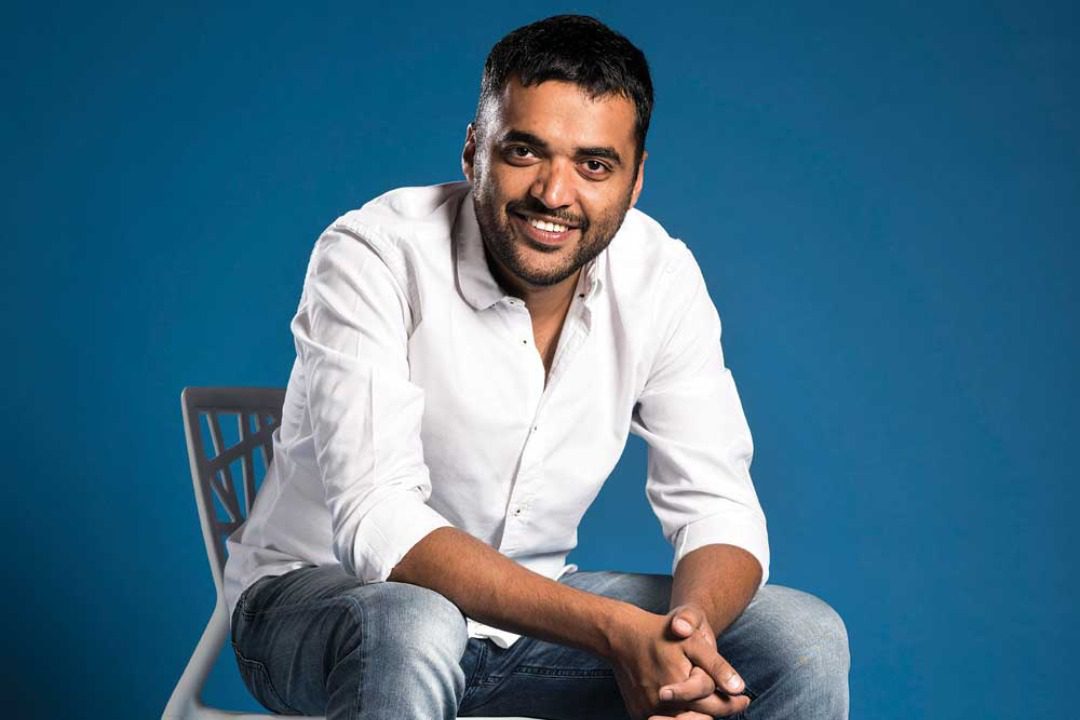(July 16, 2021; 6:55 pm) What began as an intranet website has now turned into one of the biggest food delivery companies in the country. Zomato, a brand that became a billion-dollar empire in just a decade, has now hit another jackpot with its ₹9,375 crore Initial Public Offering (IPO). Such has been the craze that its IPO subscribed nearly five times on the second day of its issue. A feat not many companies have attained. And, the lion’s share of credit goes to its founder Deepinder Goyal.
At the Zomato office pic.twitter.com/0hzeZD9M9g
— Sanjeev Bikhchandani (@sbikh) July 14, 2021
Ever since the record-breaking debut at IPO, Goyal has been at the receiving end of immense support and cheer from other entrepreneurs. From co-founder Pankaj Chaddah and Info Edge’s Sanjeev Bikhchandani and Paytm’s Vijay Shekhar Sharma, the laurels keep pouring in.
Pankaj Chaddha, the co-founder of Zomato, tweeted, “Congrats @deepigoyal & the entire @zomato team! The IPO is a huge validation of the value created through the years and is a landmark event for the start-up ecosystem. Feeling extremely lucky to have been a part of the journey. Keep showing the way! #ZomatoIPO”
Congrats @deepigoyal & the entire @zomato team! The IPO is a huge validation of the value created through the years, and is a landmark event for the start-up ecosystem.
Feeling extremely lucky to have been a part of the journey. Keep showing the way! #ZomatoIPO
— Pankaj Chaddah (@pankajchaddah) July 14, 2021
How it started. How it’s going @zomato @deepigoyal pic.twitter.com/zcNou498UN
— Sanjeev Bikhchandani (@sbikh) July 14, 2021
The humble beginnings
It was while ordering a pizza from his room at IIT-Delhi that an idea of starting a food delivery company struck Goyal. However, it fizzled out soon, and Goyal ventured into the corporate world with Bain & Company. It was here that the idea regerminated when he saw a sea of crowd struggling to place the order at the canteen during mealtimes. With the help from his colleague Pankaj Chaddah, who was also Goyal’s junior at IIT-Delhi, the two came up with a creative solution for saving time spent while ordering food. That was the beginning of Foodiebay.com. Scanning the office canteen’s menu and those from neighboring restaurants made Foodiebay.com an instant hit at Bain.
With the revenue trickling in, Goyal and Chaddah decided to turn their side hustle into a proper business. They quit Bain in 2009 and decided to start their own company.
The positive response encouraged Foodiebay.com to extend its wings to other metropolitan like Mumbai, Kolkata, Pune, and Bengaluru, and in one year, they listed over 8000 restaurants.
The game-changing e-mail
Foodiebay.com was doing well for a start-up, but little did Goyal know that an e-mail from a fan would change their lives forever. It was Sanjeev Bikhchandani, the founder of naukri.com and Info Edge, who reached out to Goyal telling him that he would like to invest in Foodiebay.com. The two signed the deal within few days of the email. Info Edge invested $1 million in 2010 in Foodiebay.com.
How Foodiebay became Zomato
With a million-dollar invested in Foodiebay.com, Goyal decided to change the name to Zomato. The entrepreneur soon realized that there was ‘ebay in his brand, and in his words, “one should not build a business on a name which has 5% chance of getting screwed in the future.”
Soon Zomato was introduced to the world with a massive marketing and rebranding exercise.
“We decided to keep the idea of food at the center but choose a name that is timeless and encompassing. We decided on the name Zomato. Zomato’s got a zing to it and is originally a play on the word Tomato. Zomato is not restricted to food either,” Deepinder Goyal wrote in his blog in 2010.
The Global Indian brand
In two years of the start-up, Zomato went international by launching its service in Dubai and Singapore. The same year, Zomato went social with its new tools asking its 2.5 million active monthly users to review restaurants and share their love for food.
In 2013, Sanjeev Bikhchandani pitched Zomato to venture capital giants Sequoia, and in no time, they jointly invested $37 million in the food delivery company, which then had 600 employees and its existence in 11 countries.
With an appetite for global expansion, Zomato acquired New Zealand’s MenuMania, Czech Republic’s Lunchtime, Poland’s Gastronauci, and America’s UrbanSpoon. With its US launch, the food aggregator brand entered the coveted unicorn club with a $50 million fundraiser from Vy Capital and Info Edge.
Trouble in paradise
The food delivery giant started facing trouble in its paradise in 2015 when it had to lay off 300 employees. It even made an exit from 14 countries it was in and reduced its cash burn from $9 million to $1.6 million.
Zomato vs Swiggy
It was towards the end of 2018 that Zomato started to feel the heat from its competitor Swiggy, that was making a big wave in online delivery food. But Goyal wasn’t ready to bow down to competition yet and introduced strict timelines for food delivery in 2015. And within one year, Zomato hit 1 million orders.
In 2018, Zomato felt a huge blow when Pankaj Chaddah, the co-founder, quit the company without any explanation. This was also the beginning of restaurants’ cold relationship with Zomato. So much so that a Log Out campaign was launched by the restaurants alleging high commissions. However, Zomato had a different story to tell and called the restaurants its partners.
It was in January 2020 that Zomato bite into its competition when it bought Uber Eats in a $350 acquisition.
And now Zomato has come knocking on the people’s doors for delivering its shares. How well would Zomato do as a public company? The whole of India’s startup ecosystem would be watching.
Editor’s Take
Deepinder Goyal revolutionized the food industry with Zomato. He literally brought every restaurant to our doorstep with just a swipe on the phone.: A feat that wasn’t achieved in the food business until 2008. Zomato’s rise from a bootstrapped venture to a company that is raising a record amount through its IPO augurs well for the Indian startup ecosystem. For the first time, a new-age Indian internet venture – typically not exposed to public scrutiny – will be dissected and analyzed. This will also be a test of whether India’s equity markets are ready to accept fast-growing, but loss-making companies. The Zomato IPO will be a testbed for Indian startups.
RELATED READ: Meet Rahul Garg, the man behind India’s first hinterland unicorn



